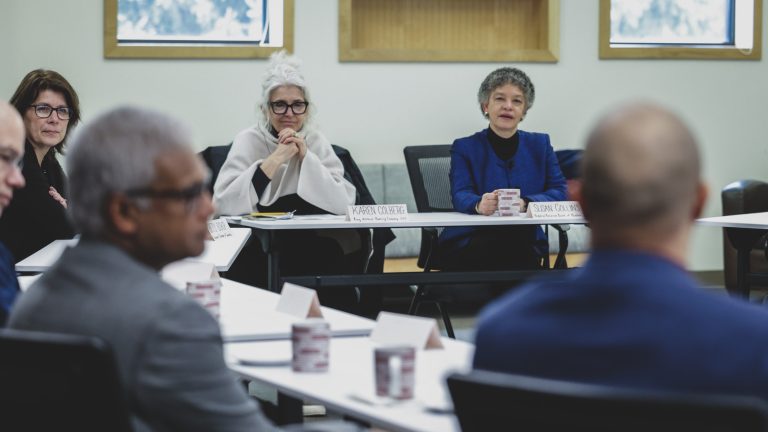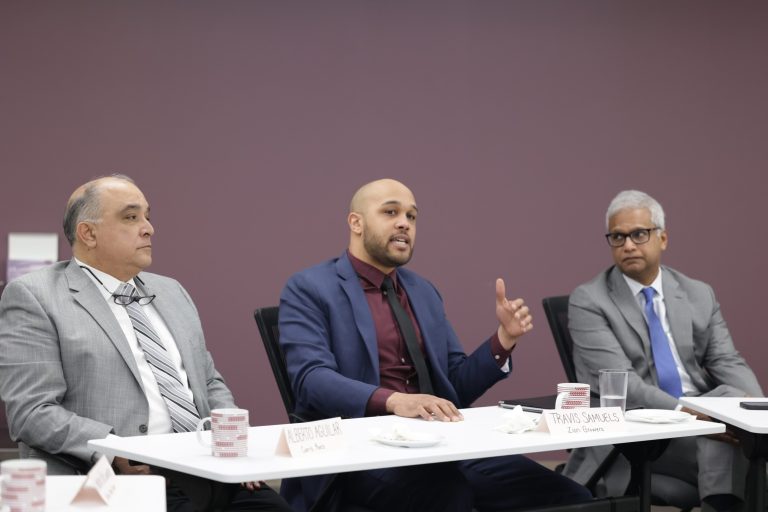Vermont business leaders met with the President of the Federal Reserve Bank of Boston, Susan Collins at King Arthur Baking Company in White River Junction as part of her ongoing visits around New England to gauge economic conditions. The meeting, convened by the Vermont Chamber of Commerce, provided an opportunity for Vermont business leaders to discuss the state’s economic challenges and opportunities.
President Collins expressed the importance of hearing directly from business owners, to ensure the Boston Federal Reserve has a well-rounded analysis of the state of the economy.
“Reaching out to and interacting with a range of stakeholders has been a priority for me since joining the Boston Fed last year,” stated President Collins. “In addition to hard numbers and surveys, information gathered on the ground about how businesses and workers are faring greatly informs my assessment of economic conditions. The views my team and I hear from around the New England region provide an important window into how well the economy is functioning for everyone.”
“The Vermont Chamber was proud to welcome President Collins to Vermont and connect her with a diverse group of leaders that represent the breadth of business in our state,” said Betsy Bishop, President of the Vermont Chamber of Commerce. “Across industry, county, and size, every business shared how they’ve had to adapt in today’s unpredictable economy. The theme throughout the conversation was the severe impacts of ongoing inflationary pressure.”
Business leaders reflected on the impact of inflation on wage growth and the move toward automation amid the inability to hire workers, as well as the lingering impacts of the pandemic on the economy.
“Revenue is up this year, however, expenses are also up. We have consistently increased our base wages between 20% and 30% each year for the past two or three years,” stated Lindsay DesLauriers of Bolton Valley. “Our operating expenses have also gone up significantly with inflation, so that we are actually behind last year right now on the bottom line. Furthermore, despite the increases we’ve made to wages and efforts we’ve made to add additional benefits, we continue to struggle to find enough staff to hire. While there is much to be proud of and optimistic about, obviously we can’t keep on this inflationary trendline indefinitely.”
“The inability to recruit and retain talent means we can’t fully staff a second shift, let alone add a third shift,” stated Alberto Aguilar of Carris Reels. “Instead, to meet demand we’re exploring how to invest in automation which is becoming crucial to the ability for us to sustain our manufacturing operations here in Vermont.”
“As young business owners, this ‘new normal’ is our reality our challenge” stated Travis Samuels of Zion Growers. “My generation’s attitudes toward work culture, consumerism, and the global supply chain have all changed and we as business owners are having to constantly adapt and pivot. Still, the reality is that there remains a great deal of uncertainty in the economy for newer businesses and it can be difficult to overcome the post-pandemic, financial, and local economic challenges.”
Additional business leaders in attendance; Karen Colberg (King Arthur Baking Company), Mark Foley (Foley Services), Jay Benson (Simon Pearce), Leslie McCrorey Wells (Pizzeria Verità, Trattoria Delia, and Sotto Enoteca), Alberto Aguilar (Carris Reels), Neale Lunderville (VGS), Melvin and Demaris Hall (Global Village), Dr. Sunil “Sunny” Eappen (UVM Medical Center), and Renee Bourget-Place (KPMG – Vermont).





